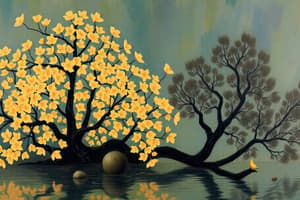Podcast
Questions and Answers
What does 'philosophia' mean in Greek?
What does 'philosophia' mean in Greek?
love of wisdom
Which two major traditions of philosophy are mentioned?
Which two major traditions of philosophy are mentioned?
- Experimental and Theoretical
- Analytic and Dialectical
- Western and Eastern (correct)
- Phenomenological and Historical
Who was charged with corrupting the minds of the youth?
Who was charged with corrupting the minds of the youth?
- Aristotle
- Socrates (correct)
- Plato
- Confucius
Plato believed that philosophical truth could only be reached through pure reason.
Plato believed that philosophical truth could only be reached through pure reason.
What is the primary focus of Eastern philosophy?
What is the primary focus of Eastern philosophy?
Which of the following did Confucius advocate for effective leadership?
Which of the following did Confucius advocate for effective leadership?
Socrates' famous saying is, 'An examined life is not worth __.'
Socrates' famous saying is, 'An examined life is not worth __.'
What are the two notable Confucian virtues?
What are the two notable Confucian virtues?
Which method involves asking open-ended questions to find the truth?
Which method involves asking open-ended questions to find the truth?
Philosophy and religion are considered separate disciplines in Eastern philosophy.
Philosophy and religion are considered separate disciplines in Eastern philosophy.
What is the first principle that a ruler should abide by according to Confucius?
What is the first principle that a ruler should abide by according to Confucius?
Study Notes
Philosophy Overview
- Philosophy or "philosophia" means “love of wisdom,” emphasizing the importance of action alongside knowledge.
- Two major philosophical traditions exist: Western and Eastern.
- Western philosophy is analytical and rigorous.
- Eastern philosophy blends with religion and emphasizes philosophy as a way of life.
Western Philosophy
-
Key figures include Socrates, Plato, and Aristotle, who explored human rational capacities.
-
Socrates
- Born circa 470 B.C. in Athens; focused on intellectual activity over appearance.
- Engaged in dialogues, primarily discussing justice, virtue, morality, and the meaning of life.
- Famous quote: “An unexamined life is not worth living.”
- Charged with corrupting youth, leading to his death.
-
Plato
- Student of Socrates, born around 428 B.C., died 347 B.C.
- Transcribed Socratic dialogues and authored "The Republic."
- The "Allegory of the Cave" illustrates the distinction between the real world and perceptions.
- Argued for seeking truth through recollection of known forms via interacting with actual objects.
-
Aristotle
- Born circa 384 B.C., studied under Plato, established the Lyceum.
- Opposed Plato’s Theory of Forms, advocating that forms are perceived through senses.
- Divided forms into substance and accidents; substance is essential, accidents result from usage.
- Advocated for the application of reason and sensory experience to understand existence.
Eastern Philosophy
- Centers around self-exploration, asking, “Who and what am I?”
- Links closely to religious practices and beliefs, emphasizing lived experience.
Confucianism
- Founded by Confucius (Kongzi) over 2500 years ago in ancient China.
- Promotes peace through personal example and virtue, asserting good rulers inspire good behavior.
- Stresses the importance of family as foundational to social harmony.
- Two key virtues:
- Jen (human-heartedness) emphasizes compassion.
- Yi (righteousness) stresses moral action.
Buddhism
- Focuses on the nature of suffering and the human struggle for lasting happiness.
- Teaches the importance of overcoming attachment to transient pleasures.
Indian Philosophy
- Prioritizes inner self-awareness and moral living over the physical world.
Opinion vs. Truth
- Opinion is personal, lacks definitive evidence and can change over time.
- Truth is universal, enduring, and verified through facts; it transcends personal belief.
- Correspondence Theory suggests truth arises from alignment between perception and reality.
Methods of Philosophizing
- Socratic Method: Encourages self-examination through open-ended questioning to uncover truth.
- Dialectical Method: A modern evolution rooted in ancient debates; focuses on understanding progress and change.
- Phenomenological Method: Investigates the essence of experiences and consciousness; foundational to modern understanding of human perception.
Studying That Suits You
Use AI to generate personalized quizzes and flashcards to suit your learning preferences.
Related Documents
Description
Explore the rich tapestry of philosophical thought in both Western and Eastern traditions. This quiz delves into how these diverse approaches contribute to our understanding of wisdom and love. Test your knowledge on key concepts and figures in both philosophical traditions.




